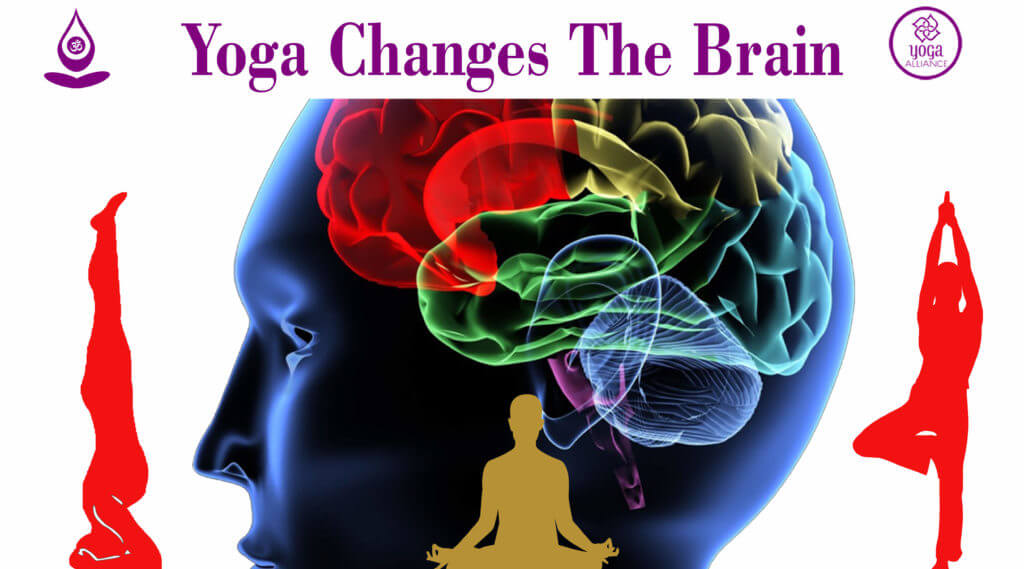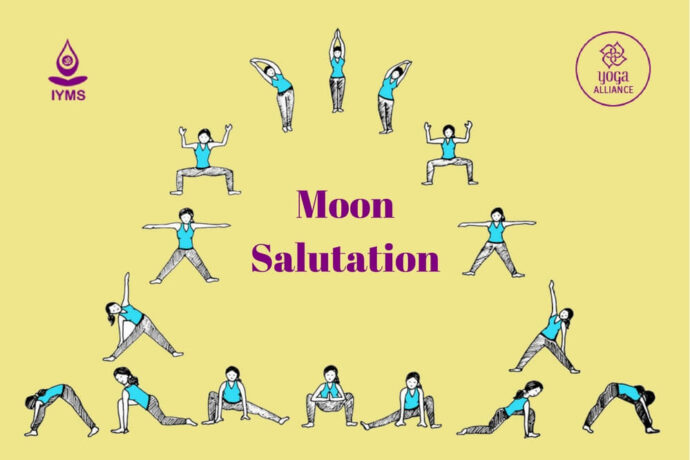Yoga is now practiced in all parts of the world due to many health benefits it offers. People are aware of the benefits yoga provide to the body, but many people do not know the fact that yoga is also beneficial for their brain. Yoga changes the brain and increases its functionality.
Mental health issues are a growing concern everywhere in the world. There is a need to find a common and permanent solution. Although science has introduced numerous medications to help curb this problem, it is only a temporary solution. Once the medication stops or the problems come back, your brain starts malfunctioning again and mental issues relapse.
Stress is one of the main factors that are responsible for most mental issues like depression, anxiety, loss of memory, and speech disorders like stammering. That is why, people require an escape via which they can free themselves from everything which makes them feel burdened and heavy. With the progress of medicine, other arenas are also coming up with solutions and yoga is one of them.
You might think, “how yoga affects the brain?” Yoga and brain function are related, continue reading the article and you will find out how.
How Yoga Affects the Body?
Yoga is a low-impact exercise that involves every organ and body part. It also involves your breathing pattern as you practice the poses thus working its way into creating balance in your body and mind. Yoga does not just focus on one part of body like most workouts, its effect is equal all over the body.
Having a regular yoga practice helps in becoming more flexible, toned, and healthy in all aspects of life. Every action you perform in practicing yoga triggers nervous system – brain, muscles, bones, and emotions all at once. Yoga poses give a holistic change that you carry in your everyday life. In this way, yoga truly can change lives.
How Yoga Changes the Brain?
Yoga has always encouraged people to bring all life experiences to the mat, letting go of negative energies, learning acceptance and gratitude, and then using the practices in your lives every day.
A 2015 study made by Frontiers in Human Neuroscience revealed that yoga could protect people’s brain from the declining grey matter brain volume as they age. In simpler words, people who performed yoga had lesser chances of mental issues as they grew older than those who did not; their brain volumes were equivalent to that of younger people.
Another to the author of Superbrain book, Master Chao Kok Sui, revealed that when children with various neurological disabilities, between the ages of 5 and 9 years, were exposed to yoga, they became more focused and performed better in education. Furthermore, these children started to display better emotional responses, a much normal behavior, and improved memory and retention rates.
How yoga helps the mind to function efficiently is not a rocket science. The concept is simple if you consider it carefully.
- When inversions are done, blood flows into the brain, hence increasing its function.
- When you do meditative poses, you will concentrate more on your third eye. Enabling you to connect with yourself at a much deeper level, especially when you can block out all external noises.
- Some of the poses like Savasana (Corpse Pose) assist you in concentrating on the stress stored in every part of your body. Also, helping you to release stress in the process.
Did you know that most of your joint pain and aching muscles are a result of all the stress in your mind? It’s time to take a stand for your well-being. It’s never too late for some yoga.
Ways Yoga Makes Changes in Your Brain Structure
There are numerous ways in which yoga works to change brain’s activities. Out of all, here are 6 ways yoga changes the brain. These mental benefits are essential to change and prepare you for the life ahead.
1. Yoga Activates Brain’s Feel-Good Chemicals
When you perform yoga, there is a spike in the gamma-amino butyric acid (GABA), dopamine, and serotonin, as per a study done by Boston University researcher Chris Streeter. Yoga makes your brain more resilient to pain. This means your threshold of pain is raised due to the boost of GABA in the brain.
According to a recent study, Effects of Yoga on Brain Waves and Structural Activation: A Review, yoga combined with awareness of breathing techniques can help to balance the autonomic nervous system, which helps in curbing the emotional turmoil that leads to depression and anxiety. It relieves you of stress stored in body and brain owing to activities carried out all through the day.
2. Yoga Causes Cortisol Levels to Drop
There are certain yoga poses (mostly inversions and poses where head is placed above the heart) that increase the flow of blood and oxygen to the brain.
This enables you to panic less because the cortisol levels in your brain drop owing to the slow and steady breathing technique adopted during the practice. In addition, this also promotes better sleep because of decreased stress levels.
3. Multiple Sections of Brain Grow in Size
A certain study by Chantal Villemure and Catherine Bushnell from the National Center for Complementary and Alternative Medicine found that certain parts of the brain has more brain cells in yoga practitioners who practiced more hours in a week.
Their research showed that following brain areas can be enlarged with yoga practice:
- Somatosensory Cortex – It has central map of human body.
- Superior parietal cortex – It is responsible for directing attention.
- Visual Cortex – It involves visualization.
- Praecuneus and Posterior Cingulate Cortex – Areas which help in our concept of self.
- Hippocampus – It helps in dampening stress.
4. Yogis Can Retain More Grey Matter
How yoga helps students is by improving their concentration levels and memory, which can help them in getting better grades in their studies. It is essential that most students practice yoga for brain memory today, especially when competition everywhere is getting tough. Also with the growing number of people suffering from amnesia, practicing yoga becomes more important than ever.
When we say grey matter, it involves the part of the nervous system which takes care of controlling the body muscles and sensory perceptions. A study by Harvard researchers at the Massachusetts General Hospital revealed that after 2 months of practicing yoga and doing meditation the hippocampus in the brain had much denser grey matter, which could result in the subject becoming more introspective and compassionate. This also leads to people having a sharper memory and improved learning skills.
5. Yoga Increases Your Cortical Folding In The Brain
The more cortical folds your brain has, the better you can perceive and process information, thus improving your decision-making skills and making you smarter even as you age. Cortical folding is also known as gyrification in scientific terms.
According to Yoga instructor and physician Dr. Loren Fishman, yoga helps in thickening layers of cerebral cortex in the brain. This part of the brain is generally associated with higher learning and its thickening results in enhancing your learning abilities and actions in day-to-day life. Thus, doing yoga for long-term helps you improve concentration, process information, and augment motor speed.
6. Yoga Activates The Parasympathetic Nervous System
The autonomic nervous system in the human brain has two partitions: Sympathetic nervous system and Parasympathetic nervous system.
Sympathetic system is generally activated when you sense danger and you react by fighting or running from the situation. Parasympathetic system acts otherwise, allowing your brain to digest the situation and then make informed decisions, which could even save your life.
Doing yoga helps to activate this part of the nervous system, especially via poses which are inversions and facilitate the flow of blood to the brain.
Other Mental Benefits of Yoga
Other than the 6 major benefits, yoga has more to offer for the mental well-being. Some of these benefits are as follows:
(a) Better Decision Making Skills and Memory
Decision-making can become a hectic process, especially if you must do it every single day of your life. Sometimes this may lead to us making the wrong decisions which might cost relationships or even a great deal of money. Nobody wants that to happen.
This is where yoga plays an essential role. It helps you to cope up with the stress and anxiety that life throws all the time. Yoga makes you a smarter person than others and helps you to solve problems with a composed and organized mind. Other than that, yoga also helps us to stay in control of what we eat.
(b) Breathing Techniques Prevents Memory Loss
As people age, most of them tend to lose their memories and are unable to carry out daily activities with ease. Yoga breathing techniques allows the brain to receive the required amount of oxygen and blood in the process.
(c) Better Computational Skills
Whether you are new to yoga or have been practicing for a long time, yoga can sharpen your mathematical ability. Researchers at Bolo University of Miami School of Medicine discovered that math computation skills of each participant before and after the session were much improved than before.
Participants undergo a session of 2 minutes of Tai Chi Movement and 2 minutes of yoga poses. The research concluded that increased computational performance is because of increased relaxation that yoga and tai chi offered to its practitioners.
(d) Beneficial For Students
Being a student is not easy and yoga can be a learning tool for students around the world. What a student needs through all the grilling classes and mountains of assignments is a stress buster to release anxiety.
Incorporating yoga into students’ daily activities can help them cope with the stress of studies. Yoga practice has been found to have calm and relaxing effect on all practitioners.
(e) Meditation Improves Brain Functionality
When you combine yoga poses and meditation, it is a way of exercising your brain and body at once. This exercise helps you to feel energetic after practicing the restorative poses, while meditation helps you be one with yourself. This enable you to be more mindful and calm in most situations.
Conclusion
Many people do not notice the change brain undergoes due to yoga until they have been into the practice for a long time. However, you should notice that when you go into yoga practice, you are stressed and tired and once the session is over you feel more energized. This is because the flow of Prana within us is stimulated. Yoga not only benefits the body, but it changes brain chemistry altogether.
Hence, if today you are in a state of mind where you are stuck in decision-making, depression, or even a feeling of lethargy. Then it is essential to start taking baby steps to improve yourselves in all directions. Yoga is not just an exercise of the body, but also of mind and emotions. Yoga changes the brain and helps you to eventually reach your goals.











Leave a comment